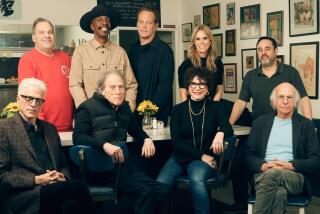A Life and Death in Hollywood : Acting: David Rappaport was trapped by his mind.
David Rappaport was as determined to die as he had been to live.
His mind--that well-schooled repository of British university education, of years of teaching and writing and musicianship and acting--had of late refused to turn itself off. The thoughts, said his cousin and manager, Frankie Leigh, kept coming like a record stuck on a turntable, ideas twisting through his brain and keeping him up night after night.
His cousin considered, then rejected, theory after theory: Perhaps his thoughts were telling him--falsely--that the woman he was about to marry might one day leave, unable to love a dwarf who might not always be the toast of Hollywood. Perhaps they told him that despite enormous success, he was still trapped--as trapped as the dwarf he had seen years earlier, caged in an English asylum for mentally retarded children.
Or possibly, in the way that mind-records have, they exaggerated recent stops and starts in his career until it seemed that all he had worked for, all he had done to escape invisibility, was gone or going.
Frankie Leigh doesn’t understand it.
He tried once before to kill himself, two weeks before his planned wedding day last March. He parked his car on a hidden stretch of road and ran a garden hose from the exhaust pipe to the interior. He passed out, but somebody found him.
After that, he swore to Leigh that he would never try again, that he would learn how to share his pain with others and take off the happy mask of one who had no problems.
But soon after his release from the hospital, Rappaport bought a gun and hid it away.
And on Tuesday, May 1, the day of his son’s 14th birthday, he slipped out of the house and drove up through the hills to a Laurel Canyon park.
According to Leigh, Rappaport went to one of his favorite spots. He said hello to people on the path and passed the man and his dog who would later find him. Deep in the park, Rappaport chose a bramble-covered spot on the hillside.
He climbed through the brush, said Leigh, and in a small clearing laid himself to rest on his back, facing the treetops.
Leigh imagines Rappaport looking at the green foliage and the uncommonly blue sky, and speaking in his heart to Adonai, the Jewish God he loved so much. He might have whispered a prayer for himself and his loved ones, a Kaddish, the prayer of life that is used in times of death.
Then David Rappaport pulled up his pistol, pointed it downward at his chest, and shot himself through the heart. His funeral was held Tuesday in London.
“I didn’t have a clue that he was depressed,” said Marsha Goodman, who worked with Rappaport on the upcoming DIC Enterprises animated series, “Captain Planet,” for which he played the voice of a robot. “I guess he’s a very good actor because we never saw that pain in his work at all. He was always telling us about all these projects in the works, scripts he was writing. He was engaged and he was planning to get married and he was so happy.”
Hollywood had been unusually kind to Rappaport. He was the first dwarf ever to star in his own television series, CBS’ “The Wizard,” and until recently had been a regular guest star on “L.A. Law.”
He was to begin shooting in September on a movie that had been a dream project for more than three years, Carol Ann Cline’s “The Poet,” the story of a dwarf poet in a Welsh village.
Rappaport first became known in this country when he starred in the 1981 movie, “Time Bandits.” A supporting role in “The Bride,” a remake of “Frankenstein” starring Jennifer Beals and Sting, landed him solidly in Hollywood.
And in the kaleidoscope of fast times that mark the lives of many in the film business, the fact that Rappaport did everything with lightening speed and unbridled passion didn’t seem unusual. He fit right in.
“He was wild,” said actor Doug Barr, who co-starred opposite Rappaport on “The Wizard.” “He went out all the time. He liked to go to clubs, go dancing.
“He was a cappuccino freak. He drank cappuccino all day long. (On “The Wizard,”) he made the prop guys install a cappuccino machine in his dressing room.”
He was born David Stephen Rappaport in 1952, the son of Orthodox Jews living in the working class borough of Islington in North London.
His parents made a gentle home in a hard area. There, among the street vendors and laborers who peopled that part of London, Dinah and Mark Rappaport held weekly Sabbath dinners, attended each Friday by grandparents, cousins, aunts and uncles.
The elder Rappaports instilled in David a reverence for Jewish ritual and culture which he later said helped him understand and live within his stunted body.
The Rappaports taught their two sons that life was to be approached with vigor.
Mark Rappaport, who worked as a taxi driver and in the garment industry while David was growing up, lived his own philosophy: at the age of 50 he went to university, and became a teacher.
By the time David was 5 years old, he was already several inches shorter than his playmates. His parents took him for tests in London, where they learned that he had a form of epiphyseal displasia, a type of dwarfism in which the torso grows, but the arms and legs are stunted and the fingers and toes are stubby and thick.
As an adult in Hollywood, Rappaport had often said that his mission was to change people’s minds about little people. His own life was a prolonged attempt to just be normal : full-sized friends and lovers, little or no contact with other dwarfs.
“We all loved him and knew him and didn’t think about it--none of his friends were really aware that he was different,” said Leigh, who was already a successful manager when she encouraged her cousin to come to the United States four years ago. “But every time he was interviewed, every single time, he was asked about being small. He couldn’t get away from it.”
Talk show host Arsenio Hall, for example, began his interview with Rappaport by making fun of the term “little people” as a more socially acceptable way of referring to people who are dwarfs, and then asked Rappaport how he could make love with a full-sized woman.
Dinah and Mark Rappaport had tried to shield their child from such prying. Wanting him to grow up feeling normal and loved, they delayed telling him about his condition. But finally, when their son was 7, they couldn’t escape it.
“He asked his parents why he never got any new clothes, why his brother was always getting new clothes,” said Leigh. “And they told him, he’s getting new clothes because he’s growing, and it doesn’t look like you’re going to grow very much.”
And so David grew up on the inside, if not the outside. Extremely intelligent, he excelled in school and played the piano, flute and drums.
“I was a couple of years older, so it seemed natural to me that he would be a little bit smaller,” recalled Leigh. “I adored him, and when we were together I always used to pick him up and give him a kiss. But one day when we were a little older I picked him up and he got very angry. He said, ‘I’m not a little child, you know.’ ”
It became terribly important to David that he be accepted despite his height, according to his own later writings. The road to that acceptance was, for him, personality and intelligence.
“My friends with whom I had laughed and fought and played with were leaving me behind,” Rappaport said in a half-hour monologue written last year for the British television show, “Opinions.” “They were growing upwards, something I knew I would never do.”
Relations with adults, he said, were even worse: “I was below them, childlike. An unknown. Not to be taken seriously. A threat.”
Sometimes as a young man he would stand on a chair at parties, to see if people treated him better if he appeared to be as tall as they. “I would win the attention of a woman (from across the room),” he said. “Then when she came close enough to see that half my height was really made up of chair, the conversation would quickly come to an end.”
After high school, Rappaport studied psychology at the University of Bristol. There he learned the history of dwarfs, the little people whose heritage was his.
He discovered that Atilla the Hun was a dwarf, as were Alexander Pope and Henri de Toulouse-Lautrec. Dwarfs were revered in ancient Egypt and other cultures, where they were believed to be in touch with the spirit world. The Irish consider a dwarf good luck.
He married--Jane Rappaport is normal size--had a son, Joe, and took a job as a teacher. He spent nearly 10 years trying to inspire 8-year-olds no smaller than he.
Since the demise of “The Wizard” in 1987, Rappaport had not had starring roles, although he worked steadily.
Some have speculated that part of the despair which led to his suicide might have been emotional fallout from the end of the series, and the elimination of his lawyer character from “L.A. Law.”
“Being different in the theater and film and television is what you want--it’s OK to be different in this industry,” said Nina Tassler, his agent at Triad Artists.
The idea of losing the stage, she postulated, might have represented losing the ability to be accepted despite his differences.
Interviews with friends and co-workers paint Rappaport as a man who put up a good front, and who virtually never talked about his problems. Among his friends, he was the one who listened when somebody had a problem.
He never talked to anybody. Not about his divorce from Jane, who remained in England with Joe, not about his height, not about his career unless it was part of planning for the future.
He didn’t really confide in anyone, not even his fiancee Eliza, a dancer more than 10 years his junior, who wouldn’t be interviewed or provide her surname.
“Actors become actors for very specific reasons, and perhaps that is one key to David,” said Tassler. “On stage you get to experience a range of emotions, work out dreams, ideas, anger, fear (that might remain hidden in normal life.) It’s an arena where you can experiment and release things that are inside of you.”
Actor Billy Barty, like Rappaport a dwarf and a founder of the Little People of America support group, said that Rappaport never came around to the group’s meetings or consulted its counselors.
“I would have loved to have talked to him,” Barty said. “But I didn’t want to force him.”
That doesn’t mean Rappaport wasn’t searching. He and Eliza went to a half-dozen synagogues in a year, trying to find the one that would bring the answers David knew God held for him.
He was small, he’d said, because God had a special plan for him.
He once told the Associated Press: “I look at (normal) boring people every day and I say, ‘God, I wish I could be like that.’ But my lot is to be unique, special, so I have to put up with it.”
Rappaport searched for his God in the synagogue, at Friday night dinners at Leigh’s home in West Hollywood, and in nature. He was an avid swimmer, spending part of most afternoons at the pool at the Roosevelt Hotel or at the beach.
He appeared unstoppable, always traveling, writing as much as acting, playing jazz piano with his stubby little fingers.
And then one day, he did stop. After the first suicide attempt, Rappaport sat at his home in the Hollywood Hills, or at Leigh’s, still not talking, but suddenly not doing very much moving.
The record in his head, he said, was spinning, and he couldn’t turn it off. “I’m all fuzzy,” he told Leigh.
He began to see a counselor, who prescribed antidepressants.
But David had always handled things his own way. He had wrenched himself out of Cockney London, out of a possible life as a victim or freak and into the bright lights of Hollywood.
It was he who had counseled others, “You have to make your life happen.”
So David Rappaport decided it was time to make his death happen. In the woods, facing God, facing the sky.
“Life is a joke,” he’d said on “Opinions.” “Anything that makes us laugh, that is surprising, is a joke. Under that definition, I am a joke. I am a surprise. I am unusual . . . I am the wild card. . . .
“That may seem painful to some people, to most people, but it only hurts when you don’t get the joke.”
More to Read
The biggest entertainment stories
Get our big stories about Hollywood, film, television, music, arts, culture and more right in your inbox as soon as they publish.
You may occasionally receive promotional content from the Los Angeles Times.










